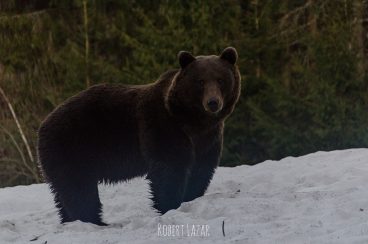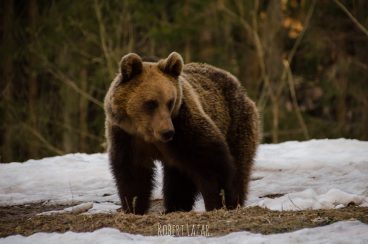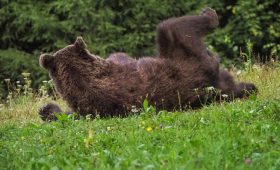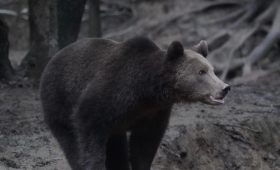During our bear watching tours we are often asked if it’s possible to go bear watching in the winter.
To start with, the chances to see bears in the wilderness (as all our bear viewing tours are) during winter are very low. And here’s why:
During winter, starting with late October or November, depending on weather conditions, bears are sleeping and living out of the fat they gain during summer. As opposed to us humans, bears are not unhappy to build fat, they will burn it by doing nothing all winter. And if you think that doing nothing is an amazing way to burn fat, don’t forget that doesn’t mean not eating either. Almost all winter, all they do is sleep.
We should not use the word hibernation because the brown bear (Ursus Arctos) doesn’t really hibernate. This doesn’t necessarily mean that you can go bear watching in the winter. The brown bears go into a deep sleep, called torpor.
Wait, what?? Is there a difference between hibernation and sleep?
Yes, there is: as your windows operates computers (sorry, Apple fans, we’re just trying to explain some things here 🙂 ), deep sleeping is a light version of hibernation. Think like that: a computer hibernation will save all docs on disk and allows the laptop to use zero power. Similarly an animal hibernating will use almost no energy, drastically reduce all metabolism and wake up slowly.
In a deep sleep (remember is called “torpor”) most body functions have reduced activity, but vital functions like breathing and blood circulation continue almost unchanged. Brain activity also doesn’t slow down, but goes into a state of permanent awareness, therefore the bear can wake up at slightest noise. Also their body temperature drops only slightly, while in hibernation there is a drastic change in body temperature.
The reserves of fat that they build during summer and fall are just enough so the bears can survive the winter, therefore for them to wake up and start looking for food in the middle of the winter is quite dangerous: this is consuming a lot of their low reserves of energy and if they don’t find food they can die in few days. Also when the spring comes they only wake up when they are sure to find enough food to survive.
For _bear watching in the late fall_ we recommend the area around Tusnad, where bears are used to lower temperatures all over the winter, so they start the torpor later on.




